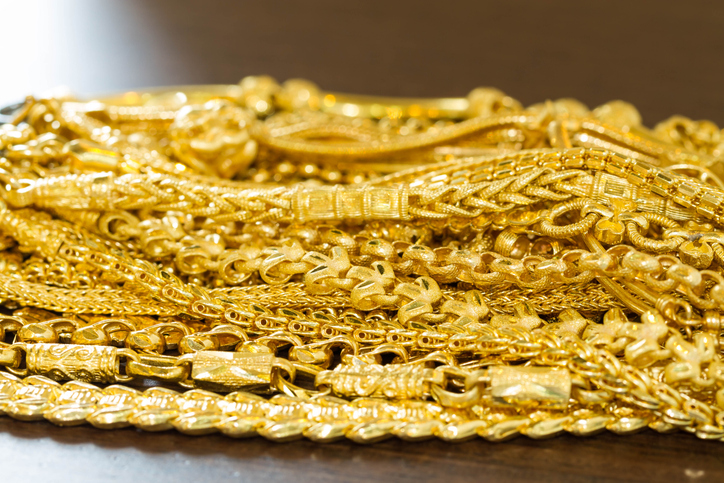Ready to sell your gold and get the best value? This guide will guide you through the essential steps, from choosing reputable buyers to avoiding scams. Let’s get started selling your gold safely.
Key Takeaways
- Selling gold can yield substantial profits, especially during periods of high market conditions. Understanding market signals is key to timing your sale.
- Choosing a reputable dealer is crucial; research their ratings and transparency to ensure a secure transaction.
- Be aware of common gold scams and take precautions during sales, such as obtaining multiple offers and verifying the dealer’s legitimacy.
Why Sell Your Gold?

Engaging in the sale of gold can be particularly appealing when inflation rates are elevated. As a safeguard against increasing costs, gold becomes an essential asset amidst economic uncertainty. During such times, gold investing offers distinct benefits, providing a secure investment option for those looking to protect their financial future. Should the economy regain stability, those holding gold investments might look to offload their assets, expecting both demand and prices for gold to wane.
Selling at moments when the market is peaking could yield significant profits, given that gold’s value fluctuates considerably. For example, a pronounced disparity between the ratios of gold to silver may suggest that compared to silver, the price of gold has reached excessive heights—this could incite astute investors into action by selling their holdings.
Deviations in gold prices from core financial indicators like bond yields point towards opportune moments for sales within the gold market. Keen observation of these signals allows investors to not only timely execution, but also optimization or possible financial gains.
What Gold Jewelry Items Can You Sell for Cash?
When considering the sale of gold for cash, numerous items can come into play. Items such as wedding rings, engagement bands, or even damaged pieces of gold jewelry are frequently sold based on their melt value. For those looking to sell quickly and conveniently, local pawn shops often provide services to buy gold jewelry.
For those in possession of physical gold like coins and bullion, cashing in could prove profitable. Dealers with a focus on specialized markets may offer more lucrative offers for gold bullion than typical buyers. This advantage grows if one has an extensive collection of physical gold ready for sale. Specialized dealers often offer the best price paid for gold bullion.
Selling timepieces crafted from gold might yield attractive prices when dealing with specialists who understand and appreciate their value comprehensively. Recognizing the variety within your assortment of golden treasures is crucial when determining how to best market them effectively to secure peak financial gain.
How to Get the Best Price for Your Gold
Understanding the current spot price of gold is crucial when seeking to secure the best possible price for your gold jewelry. This benchmark helps evaluate bids from potential buyers and enhances your ability to negotiate effectively. The value assessment of any piece depends on its weight and purity, which are essential components in determining its worth.
When buying gold, be aware of the risks associated with scams, especially on social media platforms where fraudulent sales are common. Always exercise caution and verify the authenticity of the seller to avoid falling prey to scammers.
By soliciting offers from a range of buyers, you guard yourself against lowball proposals and enhance your chances of obtaining a fair return. It’s advisable to look for merchants who impose reasonable markups above the spot price, so that you can benefit from an equitable deal.
Enhancing the attractiveness of your gold jewelry through cleaning may lead to an increase in value ahead of a sale. Notably, pieces with vintage charm or those created by renowned designers could command prices exceeding their intrinsic gold content due to added collectible merit.
Remember that gold is quantified using three ounces—each equaling 31.1 grams—which differs from the standard ounce measurement system (28 grams per ounce). A clear grasp on these metrics arm you with knowledge critical for maximizing returns when selling your valued assets, ensuring you’re better positioned to receive top dollar payouts.
Understanding Gold Scams
What is a Gold Scam?
A gold scam is a type of investment fraud that targets unsuspecting individuals, often during times of economic uncertainty. These scams can take many forms, including false promises of high returns, pressure to act quickly, and bait-and-switch tactics. Scammers may offer physical gold, gold coins, or other precious metals, and often operate through various channels, including social media platforms, online ads, and in-person sales.
Gold scams can be particularly enticing during periods of economic instability, as investors seek safe-haven assets to protect their wealth. However, it’s crucial to exercise caution and thoroughly research any gold-related investment opportunity. Scammers prey on the fear and uncertainty that accompany economic downturns, making it essential to stay vigilant and informed.
Signs of a Gold Scam
Red Flags to Watch Out For
Recognizing the red flags of a gold scam can save you from significant financial loss. Here are some common warning signs to be aware of:
- High-pressure sales tactics: If someone is pushing you to invest in a gold opportunity quickly, without giving you time to do your research, it may be a scam. Scammers often use urgency to prevent you from thinking critically about the offer.
- Guaranteed returns: No investment can guarantee returns, especially in the volatile gold market. Be wary of promises that sound too good to be true.
- Lack of transparency: If the company or individual selling the gold opportunity is unclear about the investment details, fees, or risks, it may be a scam. Transparency is key in any legitimate investment.
- Unregistered or unlicensed investment opportunities: Ensure the company or individual selling the gold opportunity is registered and licensed to do so. This can be verified through regulatory bodies.
- Unsolicited investment offers: Be cautious of unsolicited investment offers, especially if they come from unknown sources. Scammers often use cold calls or unsolicited emails to lure victims.
- Unrealistic or exaggerated claims: If the investment opportunity sounds too good to be true, it probably is. Scammers often make grandiose claims to attract investors.
- No clear exit strategy: If the company or individual selling the gold opportunity doesn’t have a clear exit strategy, it may be a scam. A legitimate investment should have a well-defined plan for how you can exit and recoup your funds.
To protect yourself from gold scams, it’s essential to do your research, work with reputable companies, and consult with a financial advisor before making any investment decisions. Additionally, be cautious of any investment opportunity that seems too good to be true, and always prioritize transparency and clarity. By staying informed and vigilant, you can safeguard your investments and avoid fraudulent schemes.
Choosing a Reputable Company

Understanding the current spot price of gold is crucial when seeking to secure the best possible price for your gold jewelry. This benchmark helps evaluate bids from potential buyers and enhances your ability to negotiate effectively. The value assessment of any piece depends on its weight and purity, which are essential components in determining its worth.
When buying gold, be aware of the risks associated with scams, especially on social media platforms where fraudulent sales are common. Always exercise caution and verify the authenticity of the seller to avoid falling prey to scammers.
By soliciting offers from a range of buyers, you guard yourself against lowball proposals and enhance your chances of obtaining a fair return. It’s advisable to look for merchants who impose reasonable markups above the spot price, so that you can benefit from an equitable deal.
Enhancing the attractiveness of your gold jewelry through cleaning may lead to an increase in value ahead of a sale. Notably, pieces with vintage charm or those created by renowned designers could command prices exceeding their intrinsic gold content due to added collectible merit.
Remember that gold is quantified using three ounces—each equaling 31.1 grams—which differs from the standard ounce measurement system (28 grams per ounce). A clear grasp on these metrics arm you with knowledge critical for maximizing returns when selling your valued assets, ensuring you’re better positioned to receive top dollar payouts.
Understanding Gold Scams
What is a Gold Scam?
A gold scam is a type of investment fraud that targets unsuspecting individuals, often during times of economic uncertainty. These scams can take many forms, including false promises of high returns, pressure to act quickly, and bait-and-switch tactics. Scammers may offer physical gold, gold coins, or other precious metals, and often operate through various channels, including social media platforms, online ads, and in-person sales.
Gold scams can be particularly enticing during periods of economic instability, as investors seek safe-haven assets to protect their wealth. However, it’s crucial to exercise caution and thoroughly research any gold-related investment opportunity. Scammers prey on the fear and uncertainty that accompany economic downturns, making it essential to stay vigilant and informed.
Signs of a Gold Scam
Red Flags to Watch Out For
Recognizing the red flags of a gold scam can save you from significant financial loss. Here are some common warning signs to be aware of:
- High-pressure sales tactics: If someone is pushing you to invest in a gold opportunity quickly, without giving you time to do your research, it may be a scam. Scammers often use urgency to prevent you from thinking critically about the offer.
- Guaranteed returns: No investment can guarantee returns, especially in the volatile gold market. Be wary of promises that sound too good to be true.
- Lack of transparency: If the company or individual selling the gold opportunity is unclear about the investment details, fees, or risks, it may be a scam. Transparency is key in any legitimate investment.
- Unregistered or unlicensed investment opportunities: Ensure the company or individual selling the gold opportunity is registered and licensed to do so. This can be verified through regulatory bodies.
- Unsolicited investment offers: Be cautious of unsolicited investment offers, especially if they come from unknown sources. Scammers often use cold calls or unsolicited emails to lure victims.
- Unrealistic or exaggerated claims: If the investment opportunity sounds too good to be true, it probably is. Scammers often make grandiose claims to attract investors.
- No clear exit strategy: If the company or individual selling the gold opportunity doesn’t have a clear exit strategy, it may be a scam. A legitimate investment should have a well-defined plan for how you can exit and recoup your funds.
To protect yourself from gold scams, it’s essential to do your research, work with reputable companies, and consult with a financial advisor before making any investment decisions. Additionally, be cautious of any investment opportunity that seems too good to be true, and always prioritize transparency and clarity. By staying informed and vigilant, you can safeguard your investments and avoid fraudulent schemes.
Choosing a Reputable Company
It is essential to engage with a reputable company when looking to sell gold, as this safeguards your interests and maximizes your returns. Assess the company’s standing by examining ratings from the Better Business Bureau, along with testimonials on consumer review platforms. Confirming an active online presence through operational links, unbiased reviews, and verified corporate information also serves as an indication of legitimacy.
The business practices of any credible gold buying entity should include forthright communication about all associated fees, such as those for repurchase agreements or shipping costs. Investigating credentials like memberships in respected industry organizations can be instrumental in pinpointing dealers recognized for their reliability.
Take Lincoln Pawn as a case in point. It offers transparent evaluations of gold items, which vouches for its dependability among sellers. Checking into the firm’s history and performance record will provide assurance in your selection process, while helping you steer clear of potential drawbacks.
The Process of Selling Gold at Lincoln Pawn

Engaging in the sale of gold at Lincoln Pawn is an efficient and trustworthy endeavor. Situated in Anaheim, Southern California, Lincoln Pawn is adept at purchasing scrap jewelry and provides prompt cash transactions to its patrons, ensuring you get your money immediately for swift financial liquidity.
To ensure customers are compensated with the maximum amount of money for their gold or other precious metals, Lincoln Pawn conducts comprehensive testing on all items they procure. This meticulous evaluation process ensures that clients receive a just price reflecting the true value of their belongings.
Opting for Lincoln Pawn when selling gold or other precious metals translates into leveraging their proficiency and gaining access to a straightforward dealing marked by transparency. Their dedication to equitable pricing and customer gratification establish them as a reliable venue for individuals intending to convert their gold into cash within the region of Southern California.
Benefits of Selling Gold Locally

Local sales of gold provide quick cash access, which can be invaluable for managing financial difficulties or taking advantage of fresh opportunities. The simplicity and time savings associated with local deals are substantial compared to engaging with buyers located in another place, away from the seller.
By transacting locally, one also reduces ecological footprints due to minimized travel requirements. Local traders often excel in customer service, offering assistance through channels such as telephone and live chat services that facilitate an effortless transaction experience.
Opting for a trustworthy dealer usually means benefiting from uncomplicated buyback arrangements that allow clients to resell their gold under clear conditions. Engaging in these neighborhood exchanges not only brings you these perks, but also supports small-scale enterprises within your area.
Common Gold Scams and High Pressure Sales Tactics to Avoid

The prevalence of gold scams requires vigilance against the various strategies employed by con artists. Scammers often use high-pressure sales techniques to coerce potential victims, using phrases such as ‘limited-time offer’ or ‘act now,’ aimed at pushing individuals into making hasty decisions.
Fraudsters also employ deceptive practices, such as phishing emails and posing as reputable dealers to swindle sellers. They frequently lure their targets with promises of exceptional returns on gold investments, which can lead to substantial financial detriment.
Groups most susceptible to these ploys include older adults and immigrants, who might not be fully acquainted with digital platforms or local economic customs. An immediate warning sign is unsolicited contact via cold calls. Upon receiving one, it’s recommended you terminate the conversation immediately and remain cautious.
Knowledge about these fraudulent tactics is crucial for safeguarding yourself from becoming ensnared by gold scams and ensuring the security of your investments.
Protecting Yourself During Transactions
When engaging in transactions, it is essential to employ certain protective measures. Initially, obtaining a second opinion when dealing with gold sales can confirm evaluations, judge the credibility of the dealer and highlight any potential fraudulent activities. If there’s pressure to decide quickly, consider stepping back for some reflection.
Defending oneself from scams involving gold requires alertness, informed knowledge acquisition, and a dose of skepticism. By scrutinizing interactions and confirming their authenticity, you can avoid becoming prey to deceitful schemes.
Recognizing the karat rating on your gold jewelry is important, because it reflects the purity of its gold content. Adhering to these cautionary steps will help safeguard your hard-earned money and ensure that you are treated fairly in financial exchanges involving jewelry made from this precious metal.
What to Do if You’ve Been Scammed
If you detect a potential scam, it is critical to react quickly by getting in touch with your bank or credit card company to safeguard your money. Immediately informing relevant authorities, such as the Federal Trade Commission (FTC) and the FBI’s Internet Crime Complaint Center, can help limit any harm caused.
For support, if you suspect you’ve fallen victim to a scam, consider reaching out for assistance from services like the AARP Fraud Watch Network Helpline. Sharing details of what transpired with someone trustworthy may offer insightful advice and help navigate towards recovery.
Prompt measures not only help recover lost funds, but also protect you against additional financial peril, thereby equipping you better for future incidents.
Summary
To maximize profitability when selling gold, it is critical to proceed with caution and be well-informed. This includes recognizing the opportune time to sell, identifying which items are eligible for sale, and securing the best possible price. Engaging a trustworthy company like Lincoln Pawn can lead to a seamless selling experience.
When considering where to sell your gold, remember the advantages of doing business locally: rapid access to cash and bolstering local enterprises. To circumvent prevalent gold scams and safeguard your interests during transactions remains paramount. If you fall prey to a scam, act swiftly by protecting your funds and reporting the fraud.
By adhering to these recommendations and insights into how the market operates, you’re better equipped to ensure safety throughout all stages of trading in gold—turning each transaction into both security towards financial gain.
Frequently Asked Questions
What types of gold items can I sell for cash?
You can sell gold jewelry, coins, broken gold items, and watches for cash. These items often have significant value based on their gold content.
How can I get the best price for my gold?
To secure the best price for your gold, stay informed about the current spot price, collect offers from different buyers, clean your jewelry, and factor in its weight and purity.
This strategic approach will maximize your return.
How do I choose a reputable company to sell my gold?
Choose a reputable company to sell your gold by checking their ratings with the Better Business Bureau, verifying their online presence, and ensuring they are transparent about fees and practices.
This will help you make an informed decision and safeguard your interests.
What should I do if I’ve been scammed?
In the event of a scam, it’s essential to immediately contact your bank or credit card provider and inform the relevant authorities about the fraudulent activity. Seeking help from support services, such as the AARP Fraud Watch Network Helpline, can be beneficial.
Acting swiftly by following these measures is crucial for limiting harm and averting additional complications that may arise from the incident.
What are the benefits of selling gold locally?
Choosing to sell gold within your local area provides the advantage of obtaining cash immediately, as well as the ease of transaction. It also benefits local enterprises and reduces its ecological footprint.
Taking this route improves not only your own financial standing, but also contributes to the development of the community.

